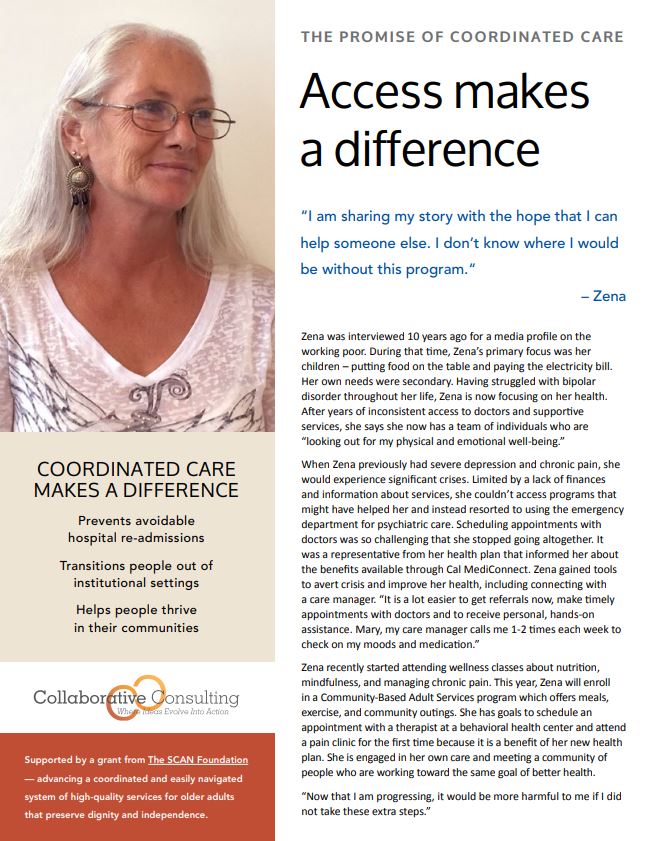The Promise of Coordinated Care: Zena’s Story
summary
Coordinated care makes a difference. It prevents avoidable hospital re-admissions, transitions people out of institutional settings, and helps people thrive in their communities. Read Zena’s case study.
Date Updated: 01/18/2016The Promise of Coordinated Care
Access Makes a Difference
Zena was interviewed 10 years ago for a media profile on the working poor. During that time, Zena’s primary focus was her children – putting food on the table and paying the electricity bill.
Her own needs were secondary. Having struggled with bipolar disorder throughout her life, Zena is now focusing on her health. After years of inconsistent access to doctors and supportive
services, she says she now has a team of individuals who are “looking out for my physical and emotional well-being.”
“I am sharing my story with the hope that I can help someone else. I don’t know where I would be without this program.“ – Zena
When Zena previously had severe depression and chronic pain, she would experience significant crises. Limited by a lack of finances and information about services, she couldn’t access programs that might have helped her and instead resorted to using the emergency department for psychiatric care. Scheduling appointments with doctors was so challenging that she stopped going altogether. It was a representative from her health plan that informed her about the benefits available through Cal MediConnect. Zena gained tools to avert crisis and improve her health, including connecting with a care manager. “It is a lot easier to get referrals now, make timely appointments with doctors and to receive personal, hands-on assistance. Mary, my care manager calls me 1-2 times each week to check on my moods and medication.”
Zena recently started attending wellness classes about nutrition, mindfulness, and managing chronic pain. This year, Zena will enroll in a Community-Based Adult Services program which offers meals, exercise, and community outings. She has goals to schedule an appointment with a therapist at a behavioral health center and attend a pain clinic for the first time because it is a benefit of her new health plan. She is engaged in her own care and meeting a community of people who are working toward the same goal of better health.
“Now that I am progressing, it would be more harmful to me if I did not take these extra steps.”
Download the publication for all visuals and complete references.
Continue Reading
This policy brief provides an introduction to The SCAN Foundation’s CLASS Technical Assistance Brief Series, which explores many of the critical issues to be considered for successfully implementing CLASS.
This policy brief describes the broad needs of individuals with disability and the wide range of supportive and environmental solutions that can allow for the most independent living possible. It suggests how findings on social and environmental supports for individuals with disability can inform implementation of CLASS.
This policy brief provides background on the historical development of benefit eligibility triggers in the private long-term care insurance market. Understanding how these triggers came into being can provide important information to those charged with implementing the CLASS Plan.


